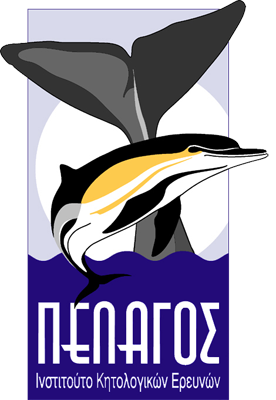
Foundation, history and brief presentation of the Institute
The Pelagos Cetacean Research Institute is
a scientific non-profit organisation aiming to the study and conservation
of cetaceans. Cetaceans include whales, dolphins, porpoises and a few more related species.
Using science as a tool, the Institute is constantly expanding the limits of knowledge about cetaceans in the Greek Seas and the Mediterranean This knowledge is then spread to the society and used as a base start for conservation efforts focused on cetacean species populations.
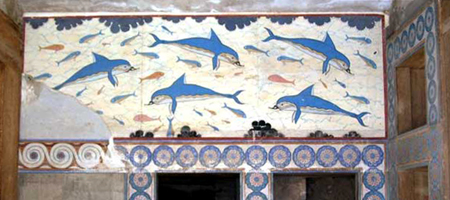 Cetaceans have been an inspiration to people since the ancient times,
when they were found to appear as a main theme on numerous wall paintings, urns, coins,
jewellery etc. In fact, cetaceans have been part of the Greek civilisation for
over 3,500 years! Furthermore, cetology, the field of hydro-biology which focuses
on the study of cetaceans, originated in Greece.
Cetaceans have been an inspiration to people since the ancient times,
when they were found to appear as a main theme on numerous wall paintings, urns, coins,
jewellery etc. In fact, cetaceans have been part of the Greek civilisation for
over 3,500 years! Furthermore, cetology, the field of hydro-biology which focuses
on the study of cetaceans, originated in Greece.
 Cetaceans have been an inspiration to people since the ancient times,
when they were found to appear as a main theme on numerous wall paintings, urns, coins,
jewellery etc. In fact, cetaceans have been part of the Greek civilisation for
over 3,500 years! Furthermore, cetology, the field of hydro-biology which focuses
on the study of cetaceans, originated in Greece.
Cetaceans have been an inspiration to people since the ancient times,
when they were found to appear as a main theme on numerous wall paintings, urns, coins,
jewellery etc. In fact, cetaceans have been part of the Greek civilisation for
over 3,500 years! Furthermore, cetology, the field of hydro-biology which focuses
on the study of cetaceans, originated in Greece.
Worldwide, the first scientific report of these animals is "Historia Animalium" written by Aristotle, and describing the cetaceans (dolphins, porpoises and whales!) as mammals, that are distinct from fishes because they do not have gills, they breath air and they give birth to live young, similarly to humans, instead of laying eggs. These were reported about 2350 years before our era!
Despite the aforementioned facts, up until the early 1990's very little was known about these animals in Greece. However, as of 1993 a team of researchers now constituting the core of the Pelagos Cetacean Research Institute, has conducted extensive research with international acclaim. The Pelagos Institute has collaborated with numerous universities, research centers, non-governmental and international organisations within Greece and abroad, conducting research and stressing the need for the conservation of cetaceans and their natural environment. Concurrently, the scientific team of the Pelagos Cetacean Research Institute has developed both national and international research projects, has published numerous scientific papers, participated in international research meetings, officially represented Greece at various international organisations and agreements, organised lectures and educational programs, published articles and appeared on television, to name a few. As a result, Greece is now amongst the most advanced countries in the Mediterranean Basin concerning the cetacean knowledge acquired.

The scientific achievements and the discoveries accomplished by the Pelagos Cetacean Research Institute, have travelled across the world through world-wide renowned communication media, such as CNN, BBC, TIME, Times, Guardian, Economist, National Geographic (US edition) and many others (to see some examples, click on the icon to the right). Especially, our discoveries concerning the causes of cetacean mass strandings, due to military sonar used during navy naval exercises, became an international issue, provoked official questions in the US Congress which led to changes in the US legislature and of course resulted in international scientific and environmental mobilization across the world regarding the problem of anthropogenic noise in the ocean.
The most important achievements of Pelagos Cetacean Research Institute are:
1) Association of usage of military sonars with massive cetacean strandings.
2) Discovery of permanent presence of sperm whales in the Greek Seas, found to be their core habitat in the eastern Mediterrranean.
3) Discovery of the worl-wide unique phenomenon of 3 dolphin species symbiosis in the Corinthian Gulf.
4) Discovery of the unique Mediterranean porpoise population in North Aegean Sea.
5) Listing of the Mediterranean sperm whale and harbour porpoises as "Endangered" in the IUCN Red Book.
6) Designation by ACCOBAMS of 8 Greek Sea areas as proposed MPAs for cetaceans (among 18 areas in the Mediterranean Sea).
7) First recording and analysis world-wide of sounds produced by Cuvier’s beaked whales (Ziphius cavirostris).
8) First effort to analyze the meaning of communication sounds produced by sperm whales (codas).
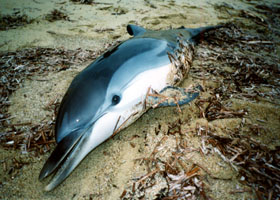
Last but not least, the most significant scientific contribution of the Pelagos Cetacean Research Institute for the Mediterranean region is that the Greek Seas exhibit a remarkable biodiversity in their cetacean fauna. The importance of this fauna for the both the marine environment and the society makes its conservation an immediate priority. However, the threats to the cetacean populations and their environment are manifold (decrease in fish stocks, chemical pollution, competition with fishermen and intentional killing, noise pollution, drowning in fish nets, disturbance to name a few) and keep increasing in number and intensity. As a consequence, some cetacean populations are drastically decreasing the last decades and start facing their extinction.
The main objectives of Pelagos Institute are:
• to conduct scientific research on cetaceans in Greece and the Mediterranean Sea as a whole
• to spread information and knowledge towards every concerned individual or public body
• to promote the public awareness
• to achieve the conservation of cetaceans and of the integrity of marine ecosystems
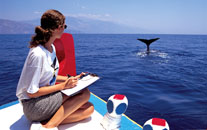
The conservation of whales, dolphins and all cetaceans requires serious scientific background and validation, as well as active public support, since occasional emotional manipulation of the public's sympathy for these animals can offer little to their substantial protection. When the decision makers, either due to pressure, or because of self-motivation, will be willing to take measures to protect cetaceans, it won’t be sufficient to claim that dolphins or sperm whales are near extinction. We need to have defined the urgent priorities for the different species and their populations, as well as to have concrete, realistic and precise proposals with measures on how to protect them. This proposals need to be substantiated with scientific arguments and data. That is why Pelagos Cetacean Research Institute primarily focuses on the research and the production of the necessary knowledge (otherwise unavailable) using scientific methods and tools, and in parallel contributes in the information and awareness of the public through participation of ecovolunteers in scientific and training programs. In this systematic and serious way, it strives for the conservation of one of the most important constituents of the natural and cultural heritage of Greece and of all the Mediterranean region.
• to conduct scientific research on cetaceans in Greece and the Mediterranean Sea as a whole
• to spread information and knowledge towards every concerned individual or public body
• to promote the public awareness
• to achieve the conservation of cetaceans and of the integrity of marine ecosystems

The conservation of whales, dolphins and all cetaceans requires serious scientific background and validation, as well as active public support, since occasional emotional manipulation of the public's sympathy for these animals can offer little to their substantial protection. When the decision makers, either due to pressure, or because of self-motivation, will be willing to take measures to protect cetaceans, it won’t be sufficient to claim that dolphins or sperm whales are near extinction. We need to have defined the urgent priorities for the different species and their populations, as well as to have concrete, realistic and precise proposals with measures on how to protect them. This proposals need to be substantiated with scientific arguments and data. That is why Pelagos Cetacean Research Institute primarily focuses on the research and the production of the necessary knowledge (otherwise unavailable) using scientific methods and tools, and in parallel contributes in the information and awareness of the public through participation of ecovolunteers in scientific and training programs. In this systematic and serious way, it strives for the conservation of one of the most important constituents of the natural and cultural heritage of Greece and of all the Mediterranean region.
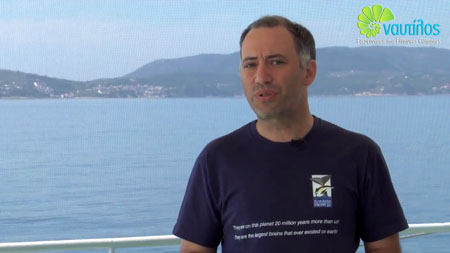 |
MAJOR GOALS OF THE INSTITUTE AND ITS WAY OF ACTION IN MATTER OF SPECIES CONSERVATION (in Greek) In this interview extract, the problems of endangered species protection are described. It is explained why Pelagos Cetacean Research Institute dedicates its principal part of efforts on the cetacean-related research, which is the only means to define well-documented solutions of protection. Subsequently, society pressure on the government can materialize them. Production: Olyvon, SKAI TV, CYTA 2011 (filming 2009) Time length 4:57" |










